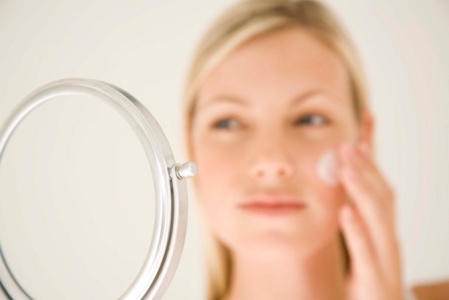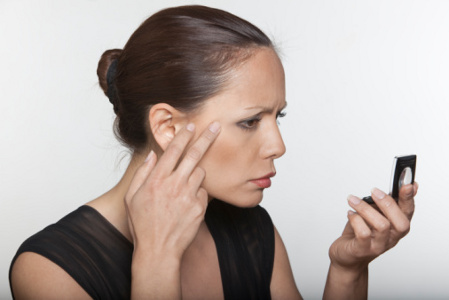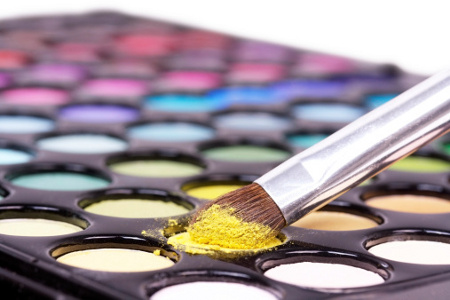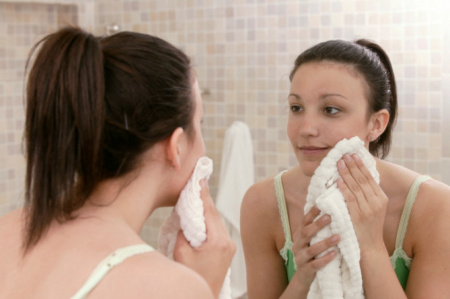Top 10 Causes of Unhealthy Skin
1 Comments
Eating Unhealthy Foods
The state of your skin reflects what is inside your body. Studies prove that when we eat nutritious foods, our skin will appear clearer than when we eat unhealthy ones. Nutritious foods including fruits, veggies, nuts, fish and seeds can improve one’s complexion while also leaving skin well moisturized and nourished. To maintain healthy skin, doctors suggest limiting eating foods that dehydrate skin such as alcohol and high-sodium foods (especially canned and frozen meals), foods that contain trans-fats, fried foods and high-glycemic foods such as pasta, white bread and sugary items. “High-glycemic foods cause your blood sugar to rise, triggering a surge of insulin. The insulin stimulates oil-producing hormones called androgens, leaving you with pimples,” Leslie Baumann, a Miami dermatologist and author of The Skin Type Solution, said. When striving to achieve radiant skin, eating healthy foods can make all the difference. Photo: Getty Images

Overexposure to the Sun
As summer approaches, it may be the perfect time to put on those shorts and lay out in the sunshine. But when heading outside, it is important to avoid overexposure to the sun and always apply sunscreen. Unprotected sun exposure causes many negative side-effects such as sunburn, wrinkled skin, early aged skin and risk of skin cancer. UVA and UVB rays from the sun produce visible skin damage that has lasting and often dangerous effects. Before going out in the sun, apply sunscreen with a minimum of SPF 30. New York City Dermatologist and Dermatologist Surgeon Dennis Gross also said it is necessary to apply sunscreen on all parts of exposed skin, including often missed areas such as the hairline, jawline and ears. Photo: Getty Images

Not Drinking Enough Water
Water is considered one of the best hydrators for skin. Failure to consume enough water can leave skin dry and lacking of moisture. Drinking eight 8-ounce glasses of water daily is recommended, but water can also be consumed through fruits, vegetables and healthy, low-sugar juices. Water also helps skin remain nourished by retaining moisture in its tissue. Photo: Getty Images

High Stress Levels
Stress can have noticeable effects on skin. Stress escalates oil production, resulting in skin breakouts such as acne. According to sciencedaily.com, a 2001 study in the medical journal Archives of Dermatology “found that stress has a negative effect on the barrier function of the skin, resulting in water loss that inhibits the skin’s ability to repair itself after an injury.” Stress-related skin breakouts can be reduced through stress management exercises such as deep breathing, keeping a positive mindset and expressing your worries with someone. Photo: Getty Images

Overconsumption of Alcohol and Smoking
An alcoholic drink here and there does not impact your skin, but high levels of alcohol consumption can lead to skin damage such as dryness, redness and premature aging. Fredric Brandt, a New York City and Florida dermatologist said drinking alcohol excessively increases inflammation “which can hasten skin sagging over time.” The skin damage may not be visible right away, but if frequent alcohol consumption continues, it can be seen years later. Like excessive alcohol consumption, smoking also damages skin with wrinkles, deep lines and a grey tone. The medical journal Plastic and Reconstructive Surgery reported that smokers age an additional three and a half years for every 10 years of smoking. Doctors suggest not smoking to maintain clear skin and a healthy well-being. Photo: Getty Images

Using the Wrong Skincare Product
With so many different beauty products on the market, it is often difficult to determine which ones to use. However, when choosing a skincare system, it is crucial to find one that matches your skin type. Using the wrong product for your skin not only fails to treat skin problems, but can also worsen dryness, oiliness, redness and breakouts. Rather than simply picking the trendiest skincare product, take time to read product labels then choose the product which best matches your skin type. If you are unsure of your skin type, research descriptions of different types of skin online or visit a dermatologist to professionally make a determination. Photo: Getty Images

Touching Your Skin and Picking at Breakouts
You probably heard it from your mother as a teen, but this skin rule is crucial: Don’t pick at or constantly touch your skin. From activities throughout the day, hands pick up germs. Touching your face before thoroughly washing your hands transfers those germs to your face and leads to breakouts. It is important not to pick at a blemish when it exposes on the skin’s surface. Allure.com said that continually touching breakouts further irritates them, resulting in two rather than one week of existence and future scarring. Photo: Getty Images

Not Getting Enough Sleep
It may be difficult to achieve with today’s hectic schedules, but getting six to eight hours of sleep is critical for healthy skin. Sleeping allows the body to recharge and rest during the night which results in rejuvenated skin. Karen Grossman, a New York City and Santa Monica, California dermatologist, said, “Sleep is also the time when your body repairs the damage from the day, and interrupting that process will slow down cell turnover.” To ensure a quality sleep, turn off electronics such as computers, the TV and cell phones before going to bed to reduce the possibility of distractions. Photo: Getty Images

Using Dirty Makeup Brushes and Old Makeup
Even though they might still work efficiently, aged makeup brushes and makeup products can infect skin and lead to breakouts. Allure.com suggests washing brushes every three weeks by cleansing them with gentle shampoo, thoroughly rinsing them and allowing overnight dry time. A deep disinfecting rids makeup brushes of buildup and germs that can irritate one’s complexion. Aged makeup products can also carry bacteria so it is important to replace them. It is suggested to get rid of mascara after three months, lip products after one to two years, eyeliner after 18 months, eye shadows after one to two years, and foundation, concealer and blush after one to two years. Photo: Getty Images

Neglecting to Wash Your Face Before Bed
Yes it’s tedious after a long and exhausting day, but it is always important to wash your face before going to bed. During the night, makeup smears on your pillow. The makeup then rubs against facial skin, clogs pores, makes skin oily and causes breakouts. “Your body temperature increases slightly when you sleep, which can enhance absorption of whatever’s on the surface. So you really want only beneficial ingredients on your face when you sleep,” Katie Rodan, an Oakland, Calif. dermatologist, said. References: http://www.qualityhealth.com/skin-care-beauty-articles/worst-foods-your-skin http://www.msnbc.msn.com/id/42342986/ns/health-skin_and_beauty/ http://thegloss.com/beauty/10-common-skin-care-mistakes/ http://www.allure.com/skin-care/2010/bad_skin_habits#slide http://www.sciencedaily.com/releases/2007/11/071109194053.htm http://fabulously40.com/blog/id/how-does-alcohol-affect-your-skin-7502 Photo: Getty Images
Add a Comment1 Comments
The picture for #4 is priceless. Great article. Thanks for sharing.
Henderson Dental Implants
October 5, 2012 - 8:23pmThis Comment